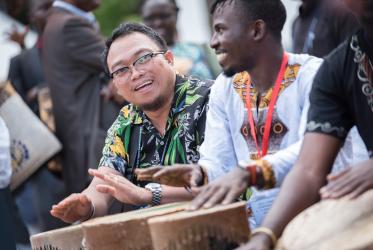Amid the reality of migration, theological education can lead to the transformation of the church, agreed participants in a seminar organized by the World Council of Churches at the Ecumenical Institute in Bossey, Switzerland, from 1 to 5 September.
Participants stressed that transformation in the ecclesial landscape is pivotal to how Christians perceive “the body of Christ and the calling to be one.” Due to the presence of migrant churches, they said, ecumenical relations are being rediscovered.
Participants in the seminar came from Switzerland, Germany, Belgium, Guinea, Indonesia, Italy, United Kingdom, Sweden and the Netherlands. Theologians, representatives of migrant churches, Christian and ecumenical organizations, were among the group.
Discussions at the event affirmed that understanding theological education in the context of migration can lead from uniformity to plurality of Christian theological and ecclesial expressions. Rev. Anne Zell and Prof. Paolo Naso from Italy emphasized that such an understanding results in new forms of ecumenical learning and being together among churches with local and migrant members.
Rev. Mery Simarmata, speaking from her Indonesian experience, said that “a shift is needed from defensiveness towards a culture of encounter.” Echoing these views, Rev. Melvin Dulfin from Sierra Leone, now a pastor in Guinea, said that promoting ecumenical ideas among migrants and local populations is even more important, especially in conflict-ridden regions.
In their deliberations, participants highlighted the need for churches to act together in preparation and execution of ecumenical formation programmes.
Realities of migration will transform how churches should do theology, too. In this context, participants said, theological education provides various models and opportunities to share resources. Theological education also offers the possibility of being challenged by each other’s views in a respectful space for dialogue. “The walk to Emmaus might serve as a paradigm in this regard: two disciples engaged in dialogue concerning issues of faith,” stated Prof. Drea Fröchtling from Germany.
Participants agreed that leadership and ministerial formation are essential for the present and future of the church. Yet, they said, the church must move away from being monocultural, monolithic, and unidirectional in order to embody the gift of diversity among the people of God.







